TODAY’S READING FROM THE OLD TESTAMENT- 2 Kings 9:14-1
Jehu, commander of the Israeli army, is a man on a mission. Whatever his motives or the morality of his free actions, he is anointed by God to rise up against his king and fulfill the task of bringing judgment upon the house of Ahab and a people who have accommodated pagan idolatry. He is ready to call out Israel’s sin and put an end to Baal worship.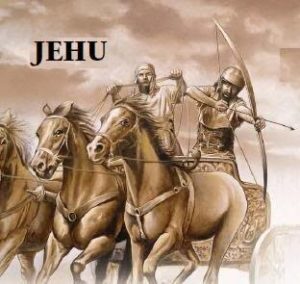
Ahaziah, King of Judah, a grandson of Ahab, also known as Jehoahaz, comes to visit his uncle, King Joram, Ahab’s son, King of Israel, in Jezreel. Joram is recovering from his wounds received in his battle with Hazael of Aram (Syria). During the visit, a watchman sees from the window Jehu’s troops approaching. Joram sends horsemen, one by one, to meet the approaching entourage with the question, ‘Do you come in peace?” This question was probably intended to mean, “Do you come with good news about the battle for the recovery of Ramoth-Gilead?”
Jehu boldly replies with a searching question that turns on the word ‘peace’, “What have you to do with peace?”, that is, ‘the peace of the Lord’, and commands them to fall in behind him.
When the watchman sees that the king’s messengers are not returning but joining with Jehu, who is driving his chariots with furious speed, both Joram and Ahaziah become suspicious and ride out to meet Jehu. Jehu speaks plainly when asked by Joram, “Have you come in peace?”,
2 Kings 9:22 22 When Joram saw Jehu, he said, “Is it peace, Jehu?” And he answered, “What peace, so long as the harlotries of your mother Jezebel and her witchcrafts are so many?”
When King Joram hears this, he recognizes his commander has turned against him and he flees, crying out to King Ahaziah, “Treachery!” Jehu draws his bow and shoots Joram between the shoulders, so the arrow pierces his heart. He orders that Joram be thrown on the field that belonged to Naboth, fulfilling the prophecy that Elijah had given in 1 Kings 21:18-24.
Ahaziah flees and is eventually wounded by his pursuers and dies at Megiddo. His servants took his body to buried with his fathers of the Davidic line in Jerusalem.
Next, Jehu returns to Jezreel, where Jezebel, hearing about this is painting her eyes and arranging her hair, looking out from her window. She makes a warning plea to Jehu, reminding him of Zimri who fifty years earlier, after killing King Elah, and exterminating the house of Baasha, lived only seven days before committing suicide. Jehu calls for her servants to throw her down from the window to her death, fulfilling Elijah’s prophecy about both her and Ahab’s son. 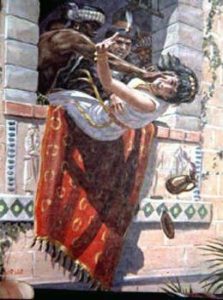
1 Kings 21:23-24 23 “Of Jezebel also has the LORD spoken, saying, ‘The dogs will eat Jezebel in the district of Jezreel.’ 24 “The one belonging to Ahab, who dies in the city, the dogs will eat, and the one who dies in the field the birds of heaven will eat.”
He then rides his horse over her body until she is dead.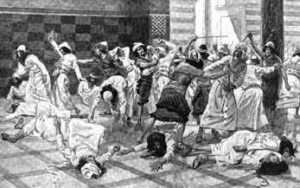
Jehu continues his ‘search and destroy’ mission to completely cut down the descendants of Ahab. He sends a letter to the caregivers of Ahab’s children to put the most worthy on his father’s throne. They realize by this time that Jehu is now king and that they dare not set up another of Ahab’s descendants to rule. Jehu asks them to prove their loyalty by bringing him the heads of all the descendants within 24 hours. 70 of the princes were killed according to Jehu’s wishes.
Jehu’s zeal goes beyond obedience to what the Lord commanded. His own pride and ambition take over. He meets relatives of King Ahaziah of Judah on their way to visit the king and queen of Israel, not knowing of what has happened. He takes them captive at first and then has them killed.
He wants to prove to Jehonadab his zeal for the Lord. Jehu gathers all the prophets of Baal, deceptively claiming that he wants to serve Baal too. As they are gathered, Jehu has them slaughtered. His guards and officers demolish the sacred stone and tear down the temple of Baal. Its ruins are to be used as a latrine.
Jehu is successful in destroying Baal worship in Israel, but, fearing the political implications, he fails to deal with the false religious system of Jeroboam, the worship of the golden calves at Bethel and Dan.
Jehu is commended for implementing God’s commands in one area- eliminating Baal worship, but reprimanded for his disregard for the law of God by accommodating the sins of Jeroboam. Faithful leadership requires uncompromising obedience to the Word of God.
TODAY’S READING FROM THE NEW TESTAMENT – Acts 17:1-34
You remember that the magistrates just wanted Paul and Silas to leave Philippi quickly and quietly, because they realized that they had made a big mistake to put Paul, who was a Roman citizen, in prison without a trial. It is another reminder that there are times when we turn the other cheek, and there are other times when it is for the advantage of the gospel, to use the God-given defense of the law.
It is possible that Luke stayed behind in Philippi because he no longer uses the pronoun ‘we’, and doesn’t do so again until Chapter 20. 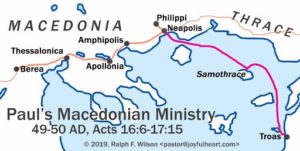
Paul and Silas (and probably Timothy) will travel southwest from Philippi about 100 miles on the Egnation Way. He passes through Amphipolis at mile 30, stopping only for the night, moves onward to Apollonia at mile 60, and then goes another 40 miles to Thessalonica, the capital city of Macedonia, a city of 200,000 people.
Paul’s pattern of ministry is to minister the gospel ‘to the Jew first’. Therefore he preaches for three Sabbaths in the synagogue. A man of Paul’s credentials would be given a hearing, as he was once a student of the famous Rabbi Gamaliel.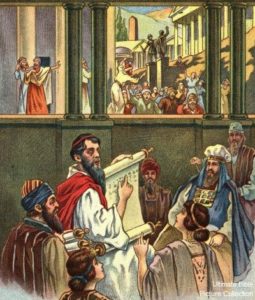
Their short stay at Thessalonica would be highly controversial yet result in the planting of a powerful evangelistic church. Paul would preach in the synagogue from the Old Testament Scriptures that Jesus is the Christ and that His death on the cross was necessary to provide atonement of our sins. Some of members of the synagogue believed as well as a great many God-fearing Greeks and leading women. This raised the ire of some of the Jewish leaders, who were jealous of Paul’s persuasive power. They instigated a riot with an angry mob attacking the home of Jason, whom they believed was housing Paul and Silas. They could not find Paul and Silas, so they took Jason to the city authorities and apparently held him hostage until money was taken as a security and an agreement was made that Paul and Silas would leave the city.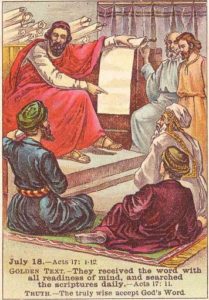
The charges brought against these church planters were such that we all wish could be said of us: “The men who have turned the world upside down have come here, also” (Acts 17:6), and they claim to serve “another king, Jesus” (Acts 17:7).
Paul and Silas are sent away to Berea. The Jewish leaders in the synagogue were more receptive than the Thessalonians. They cross-referenced what Paul was preaching with the Scriptures (Acts 17:11). The Bereans are commended because they received the Word with all eagerness, examining the Scriptures to see if these things were so. This healthy habit is often given as a model for believers, but in the context of the story, this was a habit of the spiritually hungry seekers who were not yet believers!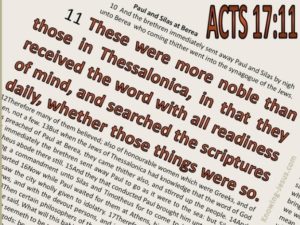
Many of them believed, including some notable Greek men and women.
The Jews from Thessalonica would give Paul and Silas no peace. They traveled to Berea to stir up crowds once again against them.
Paul goes on to Athens and as he takes in the sights of the city he sees that they have temples to every possible god they could think of: Apollo, Jupiter, Venus, Mercury, Bacchus, Neptune, and Diana to name a few. There is also a statue dedicated to the unknown God, in case they missed one out.
So Paul reasoned with the Jews and God-fearing Greeks in the synagogue and with whoever happened to be in the marketplace (Acts 17:17).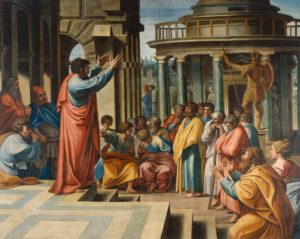
Paul’s example in Athens is instructive. He habitually took opportunities to enter into discussion with non-Christians. He identified the worldviews of his hearers. At Mars Hill, he recognized the Epicureans in the crowd. They were philosophers who lived for sensual pleasure, to eat, drink and be merry, with no belief in the afterlife or judgement. He also identified the Stoics. They were those who believed that the world is determined by fate, and that careful attention must be given to rationality, integrity and duty. Nothing is random or chance. You must accept your fate with self-mastery, suppress desires and emotions, and not allow yourselves to be broken by circumstances.
Paul preached a clear gospel while challenging the premises of their faulty worldviews. He knew their culture, could quote their poets, but he preached to them Jesus.
Paul started by affirming their common ground: “Men of Athens I perceive that you are very religious in all respects.”
He then points to the insufficiency of their belief systems. They are aware that there are many things of which they are ignorant, including the unknown God.
Their piety was based on misinformation.
He starts with the fact of creation. He challenges Epicurean’s belief that life emerges from a chance combination of atoms. He challenges the pantheism (God in everything) of the Stoics.
He also notes that God is independent from all. God is the Creator of man, not the creation of man. He is the only independent being. He is entirely self-sufficient in Himself and has no needs (Acts 17:25).
He is the sustainer of life and the determiner of every person’s eternal destiny.
Acts 17:26-31 26 and He made from one man every nation of mankind to live on all the face of the earth, having determined their appointed times and the boundaries of their habitation, 27 that they would seek God, if perhaps they might grope for Him and find Him, though He is not far from each one of us; 28 for in Him we live and move and exist, as even some of your own poets have said, ‘For we also are His children.’
29 “Being then the children of God, we ought not to think that the Divine Nature is like gold or silver or stone, an image formed by the art and thought of man.
He underscores the responsibility of every human being to this message, and explains why.
30 “Therefore having overlooked the times of ignorance, God is now declaring to men that all people everywhere should repent, 31 because He has fixed a day in which He will judge the world in righteousness through a Man whom He has appointed, having furnished proof to all men by raising Him from the dead.”
It is interesting to discover what provokes the reaction to the various messages preached by the apostles. In Jerusalem it is when they hear that God is offering salvation to the Gentiles. Here in Athens, what provokes them to mocking is Paul’s proclamation of Jesus’ resurrection.
Some were curious and wanted to hear more. We learn of the names of some of those who believed: Dionysius, the Aeropagite, and a woman named Damaris, among others.
TODAY’S READING FROM THE BOOK OF PSALMS- Psalm 144:1-15
Do you realize that the Lord is equipping you both for service and spiritual battle? He is also wanting to show You that He is your defense when the enemies that war against your soul threaten to overtake you.
Psalm 144:3 3 O LORD, what is man, that You take knowledge of him? Or the son of man, that You think of him?
This reminds us of what the Psalmist expressed in Psalm 8.
Psalm 8:4 4 What is man that You take thought of him, And the son of man that You care for him?
How we need the mind of the eternal when we see the corruptions of our natural life in time.
Psalm 144:4 4 Man is like a mere breath; His days are like a passing shadow.
This world is foreign to citizens of heaven. The kingdoms of this world are full of lying mouths and served by deceitful hands (Psalm 144:8). The Psalmist prays to be delivered from their influence (144:11).
The Psalmist anticipates the abundant blessings of the kingdom of God (verse 12-15).
Psalm 144:15 15 How blessed are the people who are so situated; How blessed are the people whose God is the LORD!
The Psalmist is ready to compose and perform new songs of praise for the One who gives him victory.
TODAY’S READING FROM THE BOOK OF PROVERBS- Prov 17:27-28
Proverbs 17:27-28 27 He who restrains his words has knowledge, and he who has a cool spirit is a man of understanding. 28 Even a fool, when he keeps silent, is considered wise; When he closes his lips, he is considered prudent.
Do you know how to exercise restraint in your speech? Do you know how to turn away wrath with a soft answer? How about keeping your cool?
At least if you say nothing, people might give you the benefit of the doubt, and think that you are wise!
PRAYER: Lord, we ask that our zeal for You would not be tainted with natural ambitions and pride. Keep us humble and ready to do Your will for Your glory. Help us to flee all idolatries in our lives. Give us the wisdom, boldness and the grace to engage non-believers in fruitful conversations about You and help us to make the gospel clear. Teach us to use restraint and may our lives make people hungry for the Bread from Heaven. In Jesus’ Name. Amen.
Pastor David
